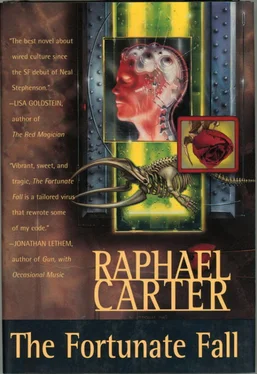Raphael Carter - The Fortunate Fall
Здесь есть возможность читать онлайн «Raphael Carter - The Fortunate Fall» весь текст электронной книги совершенно бесплатно (целиком полную версию без сокращений). В некоторых случаях можно слушать аудио, скачать через торрент в формате fb2 и присутствует краткое содержание. Город: New York, Год выпуска: 1996, ISBN: 1996, Издательство: Tor Books, Жанр: Киберпанк, на английском языке. Описание произведения, (предисловие) а так же отзывы посетителей доступны на портале библиотеки ЛибКат.
- Название:The Fortunate Fall
- Автор:
- Издательство:Tor Books
- Жанр:
- Год:1996
- Город:New York
- ISBN:0-312-86034-X
- Рейтинг книги:3 / 5. Голосов: 1
-
Избранное:Добавить в избранное
- Отзывы:
-
Ваша оценка:
- 60
- 1
- 2
- 3
- 4
- 5
The Fortunate Fall: краткое содержание, описание и аннотация
Предлагаем к чтению аннотацию, описание, краткое содержание или предисловие (зависит от того, что написал сам автор книги «The Fortunate Fall»). Если вы не нашли необходимую информацию о книге — напишите в комментариях, мы постараемся отыскать её.
“Gripping…. One of the most promising SF debuts in recent years”.
—“Publisher’s Weekly” starred review
The Fortunate Fall — читать онлайн бесплатно полную книгу (весь текст) целиком
Ниже представлен текст книги, разбитый по страницам. Система сохранения места последней прочитанной страницы, позволяет с удобством читать онлайн бесплатно книгу «The Fortunate Fall», без необходимости каждый раз заново искать на чём Вы остановились. Поставьте закладку, и сможете в любой момент перейти на страницу, на которой закончили чтение.
Интервал:
Закладка:
Mark that for human interest, Keishi. I wish I could do the whole story on this man — a cabbage-eating terrorist, it’s perfect.
“Actually, several of us were vegetarians,” he said thoughtfully. “That was her influence, of course…. After we were caught, the Guardians were hysterical enough to pick up every vegetarian they could find in Russia, reasoning that a few might have been our accomplices. It hardly mattered to them that they also got every Zen faddist and food-allergy victim in Moscow.”
“I seem to be asking you this question a lot: who do you mean by ‘we’?”
“I’m sorry, I’m not making much sense, I’m afraid. I have gone over this story in my head a thousand times, and now, when it matters, I cannot even keep it straight. It would be much easier if I began at the beginning.”
“By all means.”
Eight
A MAN WHO HAD FALLEN AMONG THIEVES
The one good feature of telepresence news—compared to text news, which is superior in every other respect—is the way you use interviews. In print, you can use only a few sentences of any interview, which means they’re mostly short. In telepresence, you can interview someone for hours, and then when you’re online, you just remember it and it’s there, a new memory in the viewer’s head. Most of it goes away when your story’s over, but it’s there while the audience needs it. You can include a whole story, not just summarize it.
Still, the holographic memory that telepresence gives is rather lossy—from a distance the event seems vivid and complete, but when you approach it, it eludes your grasp. It is a mystery to me how so much of the value of an interview can be conveyed in telepresence, when so little information comes across; but then, it is also a mystery to me how the events of your own life can matter, when memory sweeps away a thousand things for every one it lets remain.
I have an aid to memory: a copy of the screener’s disk, which Keishi kept, and which has come into my hands. While I will not release it (and don’t bother trying, I burned it long ago) I have replayed it many times, and will set down what Voskresenye said.
“I was born in Moscow, shortly after the Guardians first took that city,” he began. “By the time I was old enough to form clear memories, they had already ‘cleansed’ the country of nearly all its ‘undesirables,’ as they would say. So while my parents sometimes mentioned the purges in a whisper, I did not remember them myself, and all my childhood the Guardian regime was simply fact. If someone had asked me how I felt about the Square Miles, I might have realized that I should abhor them; but no one ever asked. I grew up less than a hundred miles from Square-Mile-on-Volga, but what happened there seemed as remote to me as squalor in the Americas does to you.”
He spoke softly, but his eyes looked directly into mine. Most people I interview won’t look straight at me; but this man’s mirror, I realized, had long ago accustomed him to scarred faces and heads full of silicon. As he began his story I again felt the intensity I had sensed in him in grayspace. If the audience was half as rapt as I was, my ratings might be almost respectable for once.
“I grew into a young man of an aesthetic and not a political temperament,” he continued, “and so managed to stay on the Guardians’ good side. As a result, I was able to attend Moscow University, even though it was then under very strict Guardian control. I was so otherworldly that I barely noticed how uneasy the other students were around me—they were Americans for the most part, the children of Guardian politicians and bureaucrats. Portia and Raskolnikov did not disdain my company; and it was with them that I spent my time. So despite the thinly veiled contempt of many of my professors, I was able to make fair grades and, if things had gone a little differently, would have taken my degree with a comfortable margin of honor.”
“What did you study?”
“My principal subject was Classics.”
“Where are your glasses, then?” I said. “I thought Classicists went blind from squinting at all that flat video.”
He raised an eyebrow. “This, of course, was back when ‘Classical culture’ meant Greece and Rome, not Hollywood and Motown.”
“Oh. Well, yes, I mean, printbooks’ll do it too.”
“Ooh, nice save,” Keishi said.
We’ll take care of it in postproduction, I said, gulping ice water in hopes of forestalling a blush.
“You think I’d let a thing like that get on the disk?” she said in mock affront.
I thanked her for the editing and God for not letting me make that mistake live. Take a note, Maya: no more banter.
Voskresenye was staring at my encyclopedia, a mocking smile curling his lips. It was the Postcops’ joke on me, though not their last or cruelest: seeing an encyclopedia in my head makes people magnify my lapses and minimize any knowledge I display. It’s like being caught with crib notes.
“I don’t really use that,” I said. “It doesn’t even work right anymore—” And what kind of idiot would wear a broken chip? I was making matters worse with every word.
But Voskresenye’s eyes were not unkind. “I see no moral difference between keeping knowledge in one’s head and on a chip,” he said.
I wanted to protest again, but it was no use. And besides, when was the last time I’d gone live without a gigabyte of background research whispering into my ear from a moistdisk? It wouldn’t hurt if it weren’t partly true.
“I suppose,” I said, “your generation was the last to spend its childhood memorizing facts, and mine the last to feel guilty about not doing it.”
“A man is fortunate if he has nothing worse than that to feel guilty about,” Voskresenye said sententiously. “However, the endeavor of memorization is a noble one. Once knowledge is centralized on the Net, it becomes very easy to change—Queen Mab need only ride the world-mind once, new dreams for old. And so in the modern age, the amasser of useless facts is your only hero. An encyclopedia that was not new twenty years ago at least provides a point of reference.”
I pulled my pride away from that last sentence, the way you’d pull a dog from a sprayed fencepost. “Does the knowledge really have to be useless?” I said.
“It need not be,” he said, “but the sort of person who will cram his head with facts, as a squirrel crams his cheeks with nuts, will most often do it for its own sake, with no thought of future use. Certainly that is the sort of person I was, as a student. Even if I had taken my degree, I don’t know what I would have done with it. I honestly don’t think I ever thought that far ahead. Of course I could not teach in the universities. No doubt I would have wound up riding herd on second-graders in Kazakhstan for a couple of years until the next purge of ethnic intellectuals.”
“What happened?”
“Two things. First, impatience. I had a fair command of Latin, but for my degree I also had to learn Greek, and I did not look forward to the years of study that would be required; nor did I want to wait so long for Homer. So I got drilled for my first socket— which was illegal for me, you understand, because I was not one of them. The law was not strictly enforced, but occasionally the Guardians would decide to make an example of someone. The socket was a small one, and I was able to hide it, but the need for secrecy gradually increased my awareness of what the Guardians were doing to our nation and its people. So I began to develop a vague, unformed, and still largely selfish political conscience—and that helped prepare me a little for what happened next.”
At this point the waiter arrived with our food, and Voskresenye was distracted by the need to dissect his pirozhki before tasting them. To get him back on track, I restated the obvious: “It doesn’t sound like you were the kind of person to defy the Guardians.”
Читать дальшеИнтервал:
Закладка:
Похожие книги на «The Fortunate Fall»
Представляем Вашему вниманию похожие книги на «The Fortunate Fall» списком для выбора. Мы отобрали схожую по названию и смыслу литературу в надежде предоставить читателям больше вариантов отыскать новые, интересные, ещё непрочитанные произведения.
Обсуждение, отзывы о книге «The Fortunate Fall» и просто собственные мнения читателей. Оставьте ваши комментарии, напишите, что Вы думаете о произведении, его смысле или главных героях. Укажите что конкретно понравилось, а что нет, и почему Вы так считаете.












